All individuals should be free to pursue their idea of the American Dream. But bad ideas, collectivism, and misguided policies are endangering the American Dream for future generations.
Preserving the American Dream
“The heart of the liberal philosophy is a belief in the dignity of the individual, in his freedom to make the most of his capacities and opportunities according to his own lights.”
–Milton Friedman
And yet, thanks to the support of our Sponsors, the Cato Institute was prepared to face these threats head-on in 2022, producing important victories for liberty and earning more support for our ideas and solutions. We have strategically invested in key policy areas where our voice will inform and guide the direction of our country, and we’re building on our successes to bring about the vision of a free, open, and prosperous society.
Defending the Free Economy
New Talent: Amplifying Free-Market Solutions
The generous support of our Sponsors allowed us to add more firepower to our team of economic experts who are promoting free market policies, highlighting how recent shortages and economic crises are the direct results of government intervention, and offering solutions to get our economy back on track.
The new additions join an already stellar lineup of experts, including Kilts Family Chair in Fiscal Studies Chris Edwards, a vocal critic of claims that more taxing and spending will reduce inflation. He was cited in the Wall Street Journal, on Fox News, and elsewhere, saying that while raising taxes on corporations is an easy political target, experts—including those on the staff of the Joint Committee on Taxation—agree that these policies can lower wages for employees, create higher prices for consumers, and reduce investment returns for people with retirement funds.
Equally important as reaching policymakers with our free-market solutions is ensuring that our economics work is accessible to the average American. This is the work of Ryan Bourne, the R. Evan Scharf Chair for the Public Understanding of Economics. Bourne is invited to testify on critical economic issues facing everyday Americans, and he educates the public on the benefits of free markets (and the government’s role in worsening inflation, reducing wages, and increasing prices of goods and services) in frequent op-eds, including a weekly economics column in the UK’s The Times.
Kilts Family Establishes Chair in Fiscal Studies
Diverse Economic Luminaries Gather at Cato to Defend Free Markets
Cato’s well-earned reputation for trustworthy, nonpartisan research on economic policies and principles attracts economic thought leaders and policymakers across the ideological spectrum to Cato HQ to discuss market freedom.
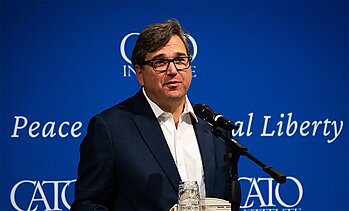
Jason Furman, chief economist for President Barack Obama
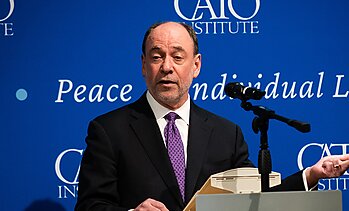
Douglas Holtz-Eakin, president of the conservative American Action Forum and former director of the Congressional Budget Office
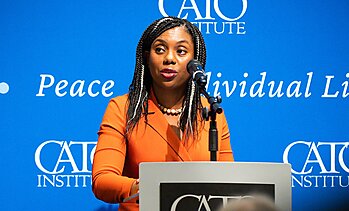
Kemi Badenoch, MP, the UK’s secretary of state for international trade
Influential voices—including Jason Furman, chief economist for President Barack Obama, and Douglas Holtz-Eakin, president of the conservative American Action Forum and former director of the Congressional Budget Office—spoke at Cato’s event “New Challenges to the Free Economy”, which aired on C‑SPAN. Kemi Badenoch, MP, the UK’s secretary of state for international trade, spoke at Cato during her visit to Washington, DC, to promote U.S.-UK trade.

The 40th Annual Monetary Conference was a must-see event and was mentioned in more than 100 articles and television programs.
Trade Free and Prosper
New Talent: Expanding the Free Trade Movement
Vice president of general economics and the Herbert A. Stiefel Center for Trade Policy Studies Scott Lincicome and research fellow Alfredo Carrillo Obregon brought their research to life with the release of the digital scrollytelling experience “The (Updated) Case for Free Trade.” Sen. Patrick Toomey (R‑PA) delivered the keynote address at a policy forum for the study, applauding the work as both comprehensive and persuasive.
In addition to its circulation to a massive online audience through Cato’s social media accounts, the study was delivered to more than 100 members of Congress. Several senior policy advisers on Capitol Hill expressed their appreciation for this latest submission on a centuries-old debate, and social media users testified to its creative brilliance in presenting digestible data on a complex topic.
Protecting Your (Digital) Wallet
The right to transact as you wish, with whom you wish, and when you wish is a fundamental civil right—one that Cato scholars vehemently defend against government overreach. Long before President Biden issued an executive order instructing federal agencies to develop regulatory frameworks for cryptocurrency, Cato scholars were educating members of Congress on policy proposals that would mitigate financial risk and protect financial privacy, while also fostering innovation and entrepreneurship.
Norbert Michel, vice president and director of the Center for Monetary and Financial Alternatives (CMFA), and Jennifer Schulp, director of financial regulation studies, regularly engaged congressional offices on regulation of cryptocurrencies and monetary policy. A bill backed by Rep. Trey Hollingsworth (R‑IN) mirrors a proposal authored by Michel and Schulp on regulating stablecoins (cryptocurrency tied to “stable” reserve assets, such as the U.S. dollar). Another bill, introduced by Rep. Tom Emmer (R‑MN), would prohibit the establishment of a retail central bank digital currency, incorporating elements of another CMFA proposal.
Michel and Schulp also regularly appear in the media to educate the public on government policies that would strip Americans of financial privacy and exert greater control of their money. Norbert’s articles about the effects of government policy on our lives appear regularly in Forbes. In 2022, Schulp’s op-eds on cryptocurrency and financial privacy were published in National Review, The Hill, Reason, New York Daily News, and NBC News.
Busting the Inequality Myth
In 2018, economist and adjunct scholar John Early published a Cato paper, “Reassessing the Facts about Inequality, Poverty, and Redistribution.” Early then teamed up with economist Robert Ekelund and former U.S. senator Phil Gramm to expand on this research. Their 2022 book, The Myth of American Inequality: How Government Biases Policy Debate, documented how the government relies on faulty data to exaggerate inequality and justify further intervention in the economy. Cato amplified the book’s release with an interactive digital product that brings the book’s data sets to life, allowing the findings to reach new audiences online.
An Explosion of School Choice
In 2022, Cato celebrated the 20th anniversary of the Center for Educational Freedom (CEF), a leading voice for liberty and choice in education from pre‑K to college. In those two decades, the Center has laid the groundwork for incredible policy successes, including expanding education savings accounts, scholarship tax credits, and more freedom from regulation for private schools and homeschooling.
20 States Have Launched or Expanded Private School Choice Programs since 2020
Cato has been a leading voice for educational choice since the 1980s, paving the way for an explosion in school choice across the country in the wake of the pandemic, with 20 states launching or expanding private school choice programs since 2020. Cato policy briefings urging universal choice helped bring about Arizona’s new Empowerment Scholarship Account program. By allocating $7,000 a year to parents for educational purposes—including private school tuition, home education expenses, educational therapies, and tutoring—Arizona has created the new gold standard in school choice.
Illegal and Unconstitutional: Biden’s Student Loan Forgiveness Plan
Cato’s education experts brought much-needed attention to one of the biggest problems in higher education: extraordinary price inflation. CEF has long pointed to the inflationary effects of federal student aid programs and has played a powerful role in pushing back against calls for “free” college and mass student debt cancellation.
Shortly after President Biden announced in August 2022 he would cancel large swaths of federal student loan debt, Cato filed suit in federal court challenging the legality of the move. Cato scholars immediately advanced to the front lines of the fight against mass cancellation, pointing out the illegality, inflationary effects, and immorality of this move, which forces taxpayers—including those who economized on college or paid off their loans—to bail out those who took out student loans.
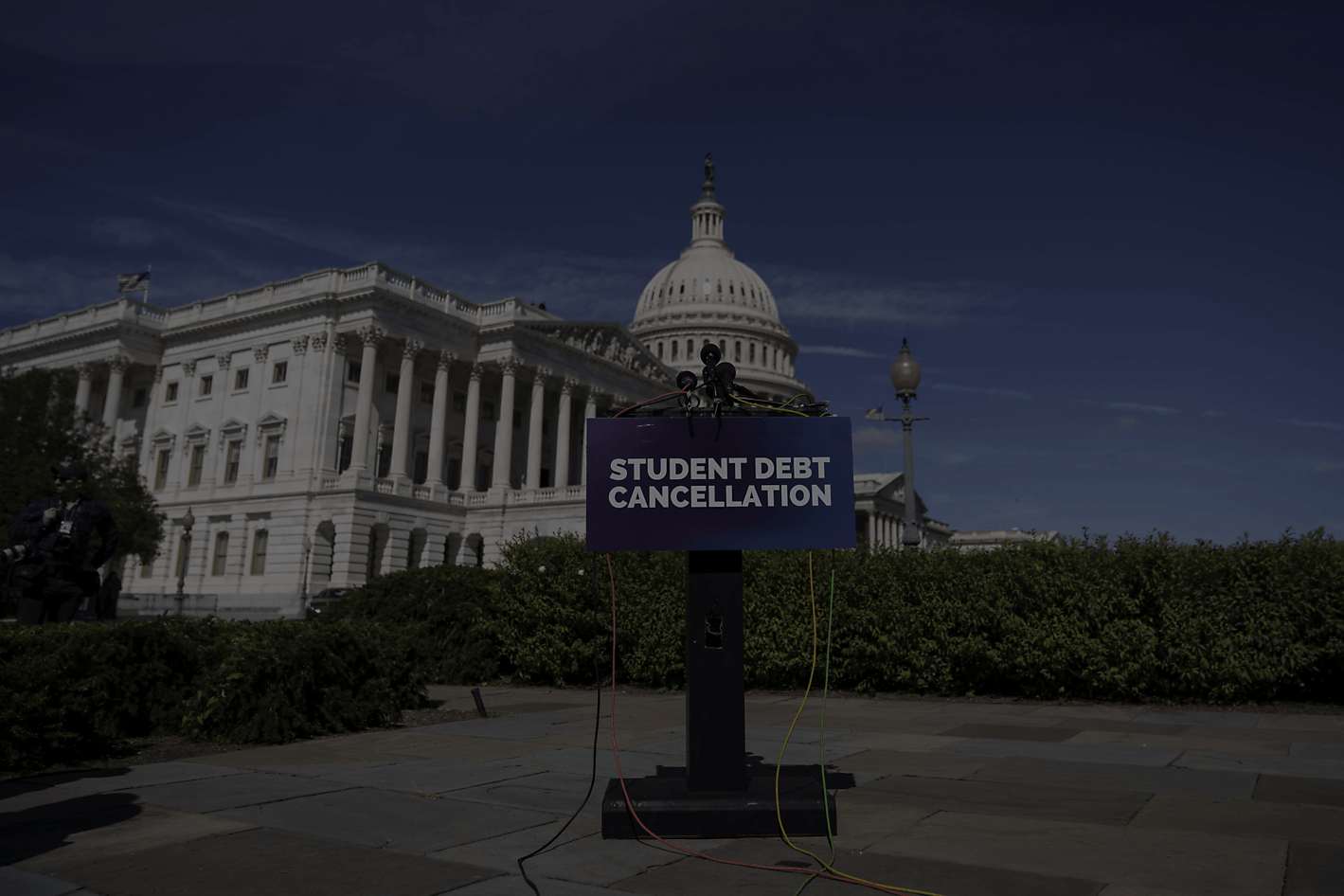
In September of 2022, CEF Director Neal McCluskey participated in a special debate episode of Dr. Phil as a leading opponent of Biden’s federal student debt cancellation plans.
“Forcing taxpayers to pick up the tab for other people’s college loans is bad policy, but in the case of President Biden’s order, it is also illegal, because neither President Biden nor the Department of Education has the power to cancel student loans without congressional authorization.”
Peter Goettler
Pioneering Peace in Foreign Policy
Cato is the think tank pioneer of a foreign policy based on realism and restraint. This has long been a lonely enterprise, but our principled position is becoming a much more prominent foreign policy stance and a major influence in national foreign policy debates. Immediately following the Russian invasion of Ukraine, the media and government seemed aligned in a crusade to portray the Ukrainian resistance as being fundamentally about U.S. security. Director of defense and foreign policy studies Justin Logan and his team publicly warned the Biden administration against reckless decisions like a U.S.-led no-fly zone, which would have meant U.S. troops entering the war. In Foreign Policy, Logan argued that Russia’s dismal performance in Ukraine showed that “Europe is rich and strong enough to defend itself. But the Europeans won’t do so unless the United States stops doing it for them.”
Logan and other members of Cato’s foreign policy team consulted with Republican senators skeptical of providing Ukraine a blank check of U.S. weapons, discussing messaging and strategy in Ukraine as well as U.S. foreign policy generally. Ultimately, 11 senators voted against the $40 billion Ukraine aid package—the clearest indication that “momentum for more restrained foreign posture … is being sustained with systemic efforts,” according to an article in Axios.
Policy analyst Jordan Cohen and senior fellow Trevor Thrall produced the fourth Arms Sales Risk Index, which measures the negative outcomes of arms sales and assesses the risks involved in selling arms to other nations. In the House’s version of the 2022 National Defense Authorization Act, 25 amendments dealt with restricting arms transfers. Twelve of those amendments included recommendations from Cato scholars. Cohen engaged the offices of Rep. Sara Jacobs (D‑CA), Rep. Norma Torres (D‑CA), Rep. Ilhan Omar (D‑MN), and Rep. Pramila Jayapal (D‑WA) on this issue.
Partly in response to the recommendations made by Cato scholars in the Arms Sales Risk Index and in private meetings over the past three years, the Department of State created the Human Rights Reporting Gateway, a portal for collecting reports of gross violations of human rights committed by non‑U.S. security forces. The portal seeks to hold the State Department in compliance with the Leahy law, which prohibits the U.S. government’s use of funds to assist foreign security forces where credible information indicates human rights violations.
Report Home
Next Chapter
Reading List
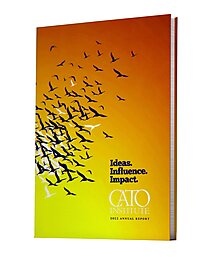
Download the Full Annual Report








